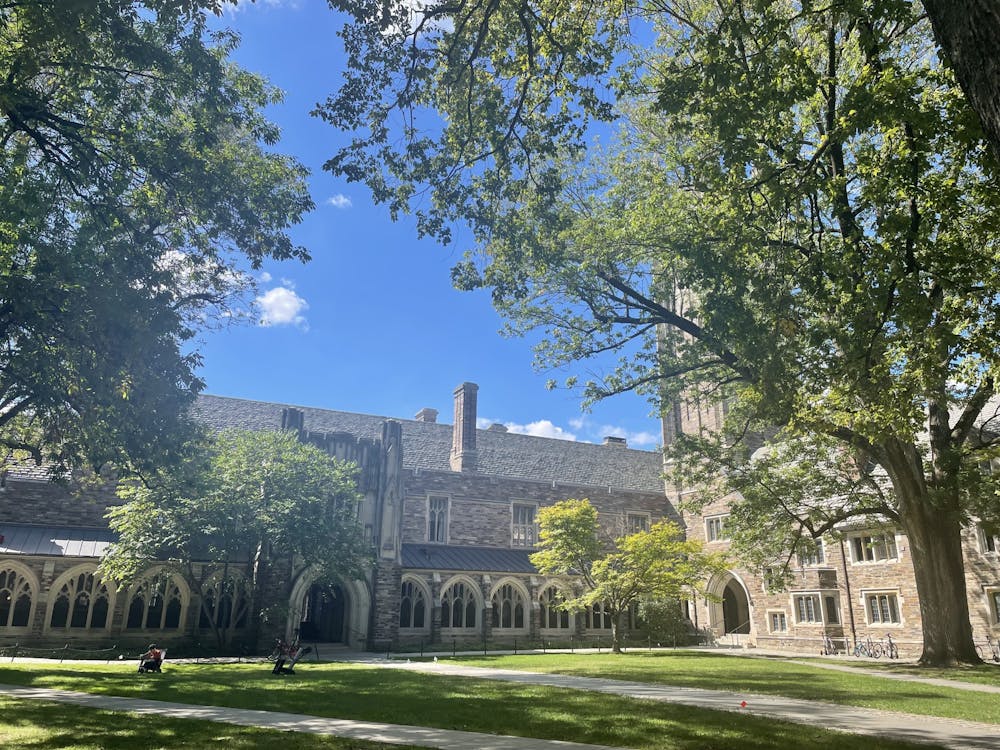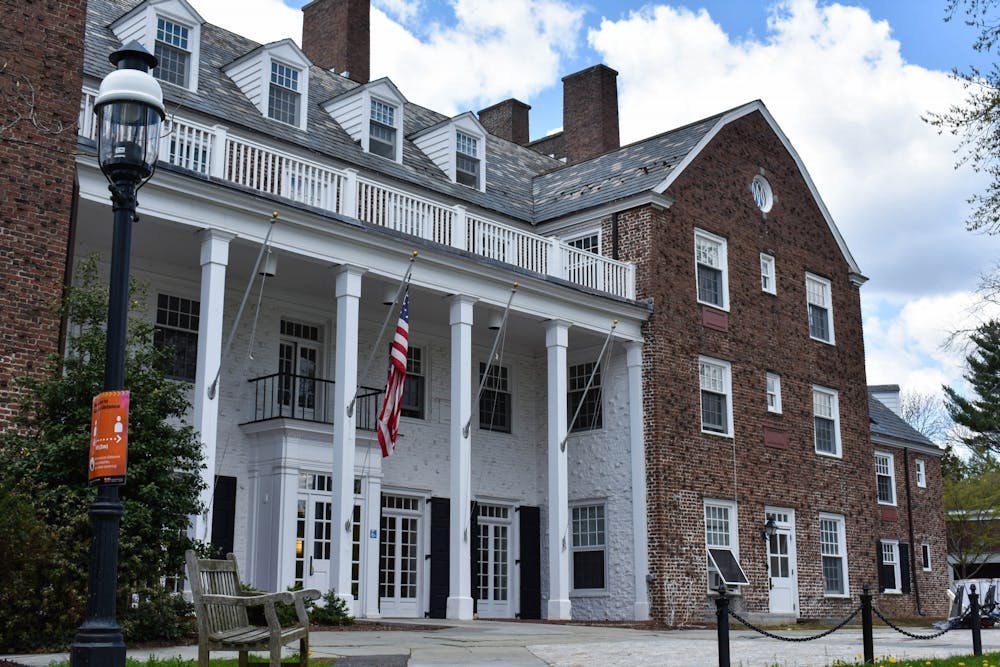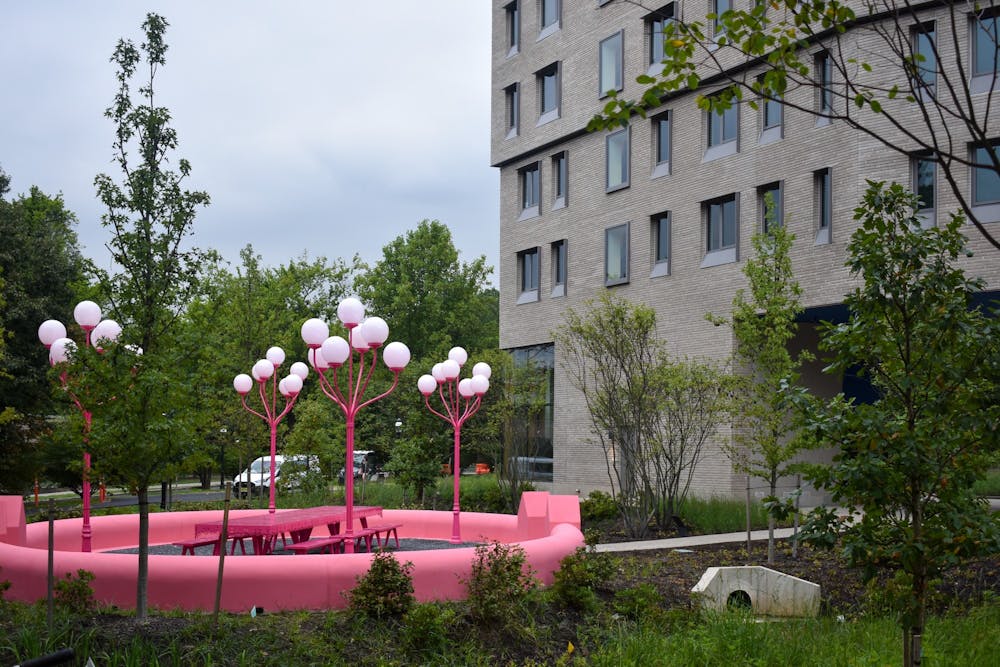What qualities define the best residential college on Princeton’s campus?
For Matheyite Maddie Esposito ’23, it’s the “great gear” and the Hogwarts-like dining halls. For Beianka Tomlinson ’24, a Residential College Advisor (RCA) in Yeh College, it’s any college that has air conditioning. And for Shireen Waraich ’24, a loyal Rockefeller College member, what really matters is the surrounding — or lack thereof: “Whitman is being surrounded by a ditch, and I wouldn’t want to live in a ditch.”
With the opening of Princeton’s two newest residential colleges — New College West (NCW) and Yeh College — for this academic year, the question of what makes any residential college the best is a hot-button issue on Princeton’s campus, especially as the University is in the process of constructing Hobson College in the center of campus where First College once stood.
The Daily Princetonian sat down with undergraduate students across class years and residential college affiliations to hear their perspectives.
Mathey College
Esposito, an RCA for Mathey, said that her residential college “has the greatest sense of community.”
“I’ve had the option to leave Mathey as an upperclassman. Additionally, as an RCA, I could have applied to other colleges, but I think that we have something really special here. I think the college staff are incredible. They truly feel like my family,” she said.
While many on campus group Mathey and Rockefeller College (“Rocky”) into one unit — in part due to their shared dining hall — Esposito said she felt there are important differences and noted the fact that Rocky was a two-year college until recently. “We’ve always had upperclassmen presence in Mathey. Rocky never had that because you couldn’t live there as a junior or senior,” she said.
Prime location was a key theme for many students. Aleha Amjad ’25, a resident of Forbes College, said that if she had to pick a second favorite college after Forbes, she would pick Mathey simply because of “how close it is to everything else.”
Other students disagreed. Tomlinson, a RCA in Yeh College, said that her least favorite residential college experience was when she lived temporarily in the former First College — despite the fact that it is the most central.
But given the choice of current colleges, Tomlinson cast her vote against the oldest housing options. To her, it all comes down to one thing: “But whichever [college] doesn’t have AC, I’m just gonna say that [that college is] the worst.”

The sun lights up Holder courtyard.
Jun Choi / The Daily Princetonian

Rockefeller (“Rocky”) College
To Waraich, a Rocky Peer Academic Advisor (PAA), Rocky is the best residential college — “purely for the vibes and architecture.”
Waraich is a copy staffer for the ‘Prince.’
When asked if Rocky’s lack of air conditioning put the college at a disadvantage to Whitman, which also has Gothic architecture, Waraich pushed back, referencing Whitman and Rocky’s respective mascots: “Have you ever seen a whale on campus? No. Do you know what you do see on campus? Squirrels. When you’re in Rocky, you get representation everywhere.”
Newer entrants to the University, however, did not share Waraich’s enthusiasm about Rocky. Rhiaan Jhaveri ’26, a resident of Whitman, said, “I would definitely not want to live in RoMa [Rocky or Mathey]. The situation with the AC is horrible and the basements look like suspicious backrooms.”
Whitman College
Students across class years spoke highly of Whitman. Tomlinson, who lived in Whitman for two years before becoming a RCA in Yeh, looked back at her time at Whitman fondly, saying, “I do think Whitman is the prettiest and has the nicest dining hall aesthetic wise.” Despite moving to Yeh, she affirmed, “I still have my Whitman jacket and I feel like a Whitman Whale.”
Jhaveri also showed support for his residential college as a first-year student, saying, “I think the one place on campus that truly feels like home is the Whitman Courtyard. People pass from there everyday and you always meet someone you know.”
For Jhaveri, it also comes down to the quality of food: “The dining hall is severely underrated. We have burrito bars and mac and cheese bars.”
Forbes College
Lawrence Azzariti ’24 currently lives in Dod Hall, but spent his first two years at Princeton living in Forbes College.
Azzariti thought the primary advantage of residing in Forbes is its sense of community.
“I feel like at Forbes there’s a very close knit community. The separation of certain colleges in all different buildings is not really as conducive to creating the kind of community relationships that you see in Forbes all the time,” he said.
Aleha Amjad ’25 expressed similar sentiments. She said, “I feel like every time I walk into Forbes, it feels like entering a big house rather than a residential college. I think another part that’s really important is you can walk from one end of Forbes to the other end without ever leaving.”
Azzariti also reflected positively on other aspects of the living experience at Forbes: “Our dining hall is one of the better dining halls and the merch that they give is some of the best on campus.”
Azzariti explained that the only reason he chose to move to upperclassmen housing was due to Forbes’ “distance relative to everything else, particularly the E-Quad and the Eating Clubs.”
Like Azzariti, Amjad also wished Forbes was closer to the rest of campus. Amjad said, “The only reason I would pick Mathey over Forbes is that it's closer to everything else. If Forbes was closer and I didn’t have to wake up 20 minutes before every class, then sure, that would be ideal.”

The entrance to Forbes' Main Inn.
Mark Dodici / The Daily Princetonian
Butler College
Butler first-years were on the whole enthusiastic about their college. Jahnavi Murthy Padukone ’26 commended both the location and amenities of the college. She said, “The location is central to almost all parts of campus. I personally also really love the fact that there are private bathrooms in a quad.”
Janul De Silva ’26 said that Butler is “pretty communal” compared to other colleges. “As far as I know, there are mostly quads and big common rooms which makes it great for working as a group,” De Silva said.
Although a resident of NCW, Haroon Adeel ’26 firmly asserted that Butler is the best residential college.
He listed several advantages of Butler: “Butler has Studio 34 with the pool and ping-pong tables close by. Soon, you end up knowing everyone who comes there, and [you] form a community. It really is a comfortable vibe. I also really like the dining hall, since it isn’t crowded aside from lunch.”
Plus, what everyone seems to keep coming back to: “It’s very centrally located,” he said.
Azzariti also appreciated Butler’s amenities. “Butler, and especially Bloomberg, would be great to live in [if I wasn’t in Forbes] since the College has all the well-fitted singles. It also has air conditioning — both of those things are really important to me,” he said.
Yeh College and New College West (NCW)
While Yeh and NCW have only just welcomed their first residents, students have already begun to feel at home in the new colleges.
Tomlinson reflected on living in Yeh after spending her first two years on campus in Whitman. She said, “I like the dining hall, I like the food, and I find myself staying in Yeh more than I did in Whitman. I feel like I can study here, get stuff done here, and just remain in Yeh for the entire day.”
Tomlinson also affirmed that Yeh was doing a good job at building community, especially through the RCAs. “I think the core group of the RCAs is very close,” she said. “We eat together, study together, and really mesh well together. I do not think the same closeness exists between the RCAs in other colleges.”
Commenting on the new college’s amenities, Adeel said, “We have the Coffee Club now, which is cool.”
Adeel also commented on how the sheer size of the colleges made community building very difficult. He stated, “There are six floors in NCW [so] it’s nearly impossible to know everyone, and the upperclassmen have also just shifted there like us.”
Esposito also felt that Yeh and NCW can be somewhat difficult to be a part of since they are still finding their own footing. “I feel like Yeh does not have its own identity yet, and while that’s okay, it can be really exhausting for someone to establish those new traditions,” she said.
From amenities and community, to merchandise quality and mascots, undergraduates consider many factors when weighing the pros and cons of each of Princeton’s seven residential colleges.
Some students prefer their assigned college, while others find themselves called to a different residential college altogether. While the arguments in support of or against residential colleges will likely continue to evolve as Hobson College is completed in the upcoming years, one thing is certain: no group of Princetonians will ever agree on which college is the best.
Aly Rashid is a Features and Newsletter contributor. Please direct corrections requests to corrections[at]dailyprincetonian.com.





